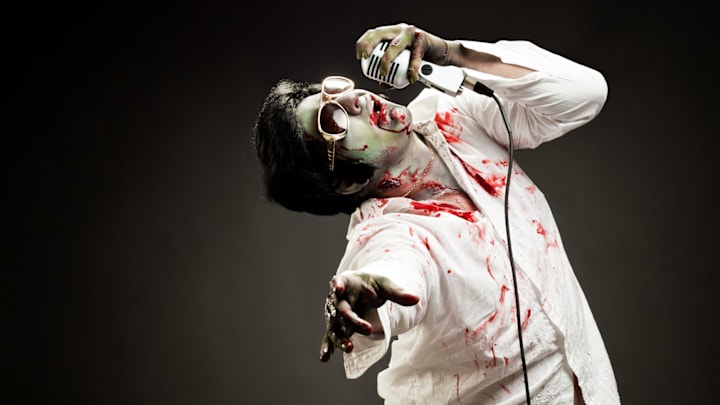Ask a hundred people their favorite Christmas song and you could potentially hear 100 different answers, as there are literally thousands of tunes to choose from. Halloween, on the other hand, has little more than “Monster Mash” and “Thriller.”
It seems odd when you compare the two holidays in other ways: Just like Christmas, there’s no shortage of Halloween-themed movies, candies, or costumes. Revelers get just as overexcited for Halloween as they do Christmas; they also tend to overeat just as much, and decorate their yards just as gaudily for both holidays. Yet there’s not a vast catalog of Halloween music.
Halloween-themed playlists often go desperately off-topic really quickly, as if they’re based on keywords rather than the songs themselves: “Ghost Town” by The Specials, for example, is about unemployment, not ghosts, and Shakira’s “She-Wolf” is about being horny, not turning into a werewolf. So just where did the spookiest holiday go astray, musically speaking?
A History of Controversy
As NPR music writer Stephen Thompson wrote in 2014, while both Halloween and Christmas are commercially-driven holidays, Christmas is part of a whole “season,” whereas Halloween is a single event. “I don’t think of [the] weeks [leading up to Halloween] as ‘Halloween season,’” Thompson said. “And I don’t think of my trips to the grocery store and various online retailers to be part of ‘Halloween shopping.’ There’s precious little Halloween music for the same reason there’s precious little Super Bowl music; neither marks a major holiday so much as an event.”
As a result, Thompson points out that the Halloween-specific music that does exist—including “Do They Know It’s Hallowe’en?,” a spooky remake of Band-Aid’s “Do They Know It’s Christmas?,” and Ryan Gosling and Zach Shields’s formation of Dead Man’s Bones for a single, self-titled album of Halloween music in 2009—is equally fleeting. While recording a Christmas song or album has become a rite of passage for hundreds of well-known musicians (Mariah Carey is currently getting flak for trying to trademark the name “The Queen of Christmas”), the lack of Halloween music that exists makes the idea of recording an entire album a major undertaking (as covers of classic holiday tunes are largely out of the question).
The darker connotations of the holiday also don’t help. Halloween has changed a lot over the years—much more so than Christmas. While the holiday’s origins go back thousands of years to the Celtic festival known as Samhain, a lot of Halloween’s more prominent iconography and traditions, such as trick or treating, are significantly more recent developments, as divination rituals have given way to costume parades.
While Christmas isn’t a universally celebrated holiday, its existence as a holiday doesn’t tend to offend a lot of people—something that can’t be said of Halloween. Some Christian groups are extremely opposed to people frivolously enjoying what they see as a celebration of evil forces—a factor that could be extremely detrimental to would-be record sales.
Jack Chick, the fundamentalist cartoonist whose tiny comic books (known as Chick tracts) were distributed to millions of people each year, was a prominent anti-Halloween activist who once stated: “Satan loves Halloween because it glamorizes the powers of darkness, drawing little kids into his camp.” While this is hardly a mainstream view, there has been enough suspicion around Halloween over the years to potentially put off some artists and companies from investing too much time in finding creative ways to sing about ghosts, goblins, and other supernatural villains.
A Graveyard Smash
When the Great American Songbook was established in the first half of the 20th century, radio very much tended toward the conservative side, so Christmas is the only holiday that made it into the codified canon of standards.
Bobby “Boris” Pickett’s “Monster Mash” is undoubtedly king of what few Halloween songs there are. The song, which was first recorded in 1962, topped the Billboard charts upon its release and has risen from the dead to reclaim its place on the charts several times over the years as October 31 approaches. While the song never explicitly mentions Halloween, and was originally released in August, Pickett’s decision to impersonate 1940s horror icons Boris Karloff and (briefly) Peter Lorre make it a cheerful celebration of horror archetypes. Best of all, it’s catchy, silly, and fun—and not scary in the slightest.
Probably the greatest contender for the throne that has long been occupied by “Monster Mash” is “This Is Halloween,” from The Nightmare Before Christmas. It is an excellent song that, for those among us without the vocal talents of the great Danny Elfman, is quite hard to sing in its entirety—it goes both very high and very low and requires a lot more flair to pull off than an amateur rendition of “Jingle Bells.” Perhaps the answer is to adopt the sing-along-ability of Christmas classics by simply replacing the words.
In 2020, Maria Asimopoulos summed up the simplest reason for the lack of Halloween music for The Daily Fandom by concluding, “Christmas is a holiday associated with happiness and joy. At the same time, Halloween embodies terror and death, so it makes sense why Ariana Grande isn’t jumping at the chance to darken her brand of pop with the grim reaper.”
